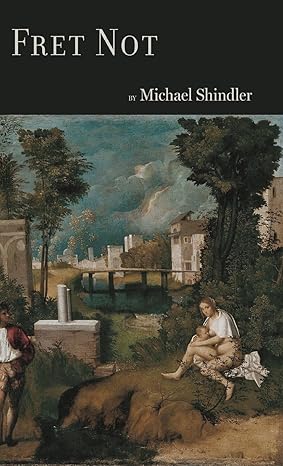
By Michael Shindler.
Finishing Line Press, 2024.
Paperback, 40 pages, $17.99.
Reviewed by Dan Rattelle.
A first look at Fret Not quickly reveals that its author, Michael Shindler, does not have an MFA. Good. Absent is any sort of knowing irony in its deeply felt “Invocation,” from which the volume takes its name. “Fret not over the blind judgement / of hyacinths”—the poet invites his muse, a child, to “Sing now, child, in the valley-glade.” Surely, such a line would have been workshopped into something boring or, more likely, eliminated entirely. Sure, it’s old music, but we’re grateful to hear it sung afresh.
Shindler isn’t merely aping the Edwardians when he observes “a satyr singing in the mist,” but he does owe a debt to that long-out-of-fashion and doomed generation. The innocence of these poems, or at least their affect, is all Edwardian. The sincerity with which he invokes his muse, with which he observes the white stag with silver horns or “a hero long-returned from/ The vicissitude of rude adventuring,” betray nothing of a rehearsed “new sincerity.” He sings with too much nonchalance. And sing he does. The poems of Don’t Fret rhyme (if irregularly), refrain, repeat, and delight in their incantation.
More daring, perhaps, than even the satyr is the direct treatment of the great god himself in the poem “Pan is in the Wood.” This brief poem, just seven short lines, reads like an epitaph for poetry. “Pan is in the wood/ And she heard him, / though he is dead.” These lines are worth the price of admission. Poetry, particularly poetry of this kind, has been proclaimed dead too many times to count. Still, elect souls will hear the music of the pan-pipes on the wind.
Though absent credentialed preciousness, this collection does show meticulous attention to bookmaking. Each poem is carefully placed and formally varied, weaving lyrics and more narrative pieces together into a cohesive book of poetry. Best of all, Shindler doesn’t overstay his welcome. He sings well and leaves us ready to hear some more.
If an apprentice, Shindler has fully digested his influences. There’s an echo of Philip Larkin in the qualifications of “A Pinewood.”
A pinewood sways breathless
In heaving breaks of light,
Its fruit falling – almost deathless
From an almost heavenly height
But the sentiment is Shindler’s, who awaits what for Larkin is impossible—nature’s theophany. It is the Larkinesque near-miss that keeps these lines from veering into Wordsworth’s pantheism. Though Shindler is neither Larkin nor Wordsworth. His true master is A.E. Housman. Both are poets with a solid ear, a bit of melancholia, and a way of putting things just-so who choose not to foreground an immense learning. Ultimately, though, Shindler is like all other poets worth the name. He loves his language and knows how to use it down to the minutest syllable through to a collection of sustained beauty.
Dan Rattelle is a poet and the author of Painting Over the Growth Chart (Wiseblood, 2024). He lives in Western Massachusetts.
Support the University Bookman
The Bookman is provided free of charge and without ads to all readers. Would you please consider supporting the work of the Bookman with a gift of $5? Contributions of any amount are needed and appreciated!